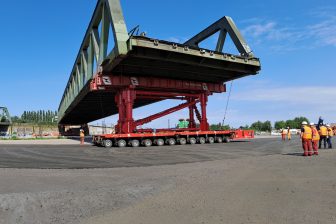EC: More Terrorism Protection of Freight Transport
Brussels, Belgium – The European Commission proposed new European rules to protect freight transport better against terrorist attacks. These rules will enhance the security of the supply chain in land transport. The rules will allow operators which participate in the scheme to enjoy benefits in the area of security control and give such operators an enhanced security standing in their relations with commercial partners, including insurance companies.
Jacques Barrot, Vice-President responsible for transport stated: “the new rules will make the European Union the first trading bloc in the world to add a full security dimension to all forms of freight transport. These rules will help to prevent terrorist attacks in the EU”.
The proposal strengthens the prevention against possible terrorist attacks in the EU by promoting security on inland transportation of goods by trucks, trains and also barges. It reconciles the goal of increased security with ensuring a rapid trade flow in the European market and complements existing European rules for air and maritime transport as well as airport and seaport security.
The proposal:
- Invites commercial operators to bring their security performance in the supply chain up to minimum European standards. Such operators will receive ‘secure operator’ status from national authorities for a period of three years which is renewable;
- Allows a nationally awarded ‘secure operator’ EU-wide recognition;
- Facilitates the creation of secure supply chains consisting of ‘secure operators’;
- Enables a ‘secure operator’ to enjoy fast track treatment at security checks both inside the EU (e.g. ports) and at external borders where customs are implementing new security rules;
- Encourages ‘secure operators’ to positively distinguish themselves from non-secure competitors in the transport market.
To obtain secure operator status an operator will have to implement and document a security management system, ensure that resources are made available to counter security risks, and meet a number of specific requirements which the annexes to the proposed regulation set out in detail. These relate to issues such as physical protection of buildings, access control, personnel and security procedures. Secure operator status can be withdrawn in case of serious or repeated breach of security requirements, in which case the operator may re-apply only after two years.
This proposal will increase security awareness in the EU supply chain sector which currently consists of more than half a million companies in transport and ancillary services alone. It takes into account the considerable size of the supply chain market and the impossibility of introducing all-embracing security measures which would be difficult to implement and control at reasonable cost. It sets a flexible framework of minimum requirements which can gradually evolve with technology and risk developments. It covers all links in the supply chain and makes each link responsible for its own security, including shippers, transport and forwarding companies, warehouses and storage facility operators.
The scheme is voluntary and was prepared through intensive stakeholder consultations. The Commission believes that an increasing number of operators will participate in this security partnership over the coming years, particularly in view of growing demands for transport security from shippers concerned about their own brand security. Apart from saving valuable time through a fast track treatment at ports and terminals, secure operators will also face less red tape. Interconnecting various transport modes will be facilitated as security standards for inland transport will complement strict EU rules which already apply to air- and seaports.
The scheme will benefit a growing number of operators who are willing to invest in security but hesitate for fear of wasting valuable assets. By setting European minimum security requirements the proposal will have an additional positive impact on the prevention of transport crime.
The proposal is made in the form of a regulation which needs the approval of European Parliament and Council of ministers. The national set-up to award secure operator status should be in place at the latest 18 months after adoption of the regulation.
For more information on existing security measures in aviation and maritime transport and for the full text of the proposed regulation, please consult:
http://europa.eu.int/comm/dgs/energy_transport/security/index_en.htm
U las zojuist één van de gratis premium artikelen
Onbeperkt lezen? Profiteer nu van de introductieaanbieding voor € 10,- per maand.
Bent u al abonnee?



